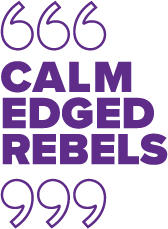Does thinking about the vastness of the metaverse fill you with dread? Don’t panic: we’re here to help.
Since Mark Zuckerberg bought it to the fore, Advita has been knee-deep in research to understand what this metaverse concept means and why organisations should start paying it more attention.
Web3, virtual reality, augmented reality, artificial intelligence: this episode digs deep into what these mean for the world of work. As business leaders, strategists and communicators, do we need to upskill ourselves? If we do, then how?
In episode 9, with our opposing reactions to such big ideas, we reminisce how far technology has evolved, debate whether this digital trend will endure or die out, and how to regulate something that’s decentralised before it becomes the Wild West.
Below is an extract from Advita’s original blog, where she shared her thoughts on the metaverse. If you’d like to chat with Advita about this area of work and how it might play out in your organisation, then she’d be delighted to hear from you.
The Metaverse
Imagine a world where you choose where to work out – on Venice Beach or outside Sydney Opera House. A future that allows you to pick your hours, where to work, what projects to work on and be paid immediately via your crypto wallet. A place where you can meet colleagues in virtual rooms, regardless of where they are based. A space where you meet friends in New York and then Shanghai.
This may sound like science fiction, but it’s more of a possibility than you think, thanks to the metaverse.
There may be some scoffing at the back of the room, but the metaverse and everything it involves should be taken a little seriously by communicators and business owners. By 2026, more than $10 trillion will be invested in this space, and 25% of people will spend at least one hour a day in the metaverse for work, shopping, education, social and/or entertainment.
What is the metaverse?
There are many complex and sometimes vague definitions to this hybrid word: see Comms Rebel’s jargon buster here) but essentially, it’s a virtual reality world where users can connect and experience things as they would in the physical world. It allows them to interact with a digital projection of objects and people using existing augmented and virtual reality tech. You can also access a crypto wallet that contains real digital money for digital purchases.
In some metaverses, people buy digital land for thousands of dollars and dress their avatars in designer goods via non-fungible tokens. If you want to know more about NFTs, read this.
Why should we care?
It sounds slightly surreal to be thinking of something so advanced when you look at where we are right now with technology in many organisations. Clunky lT systems, VPN tokens, multiple sign-ins, outdated phones, messy infrastructures and inaccessible platforms. But as frustrating as this seems, it was only 25 years ago we were connected to a 56kb modem, and a webpage took five minutes to load.
The concept of the metaverse isn’t new. It has existed in the gaming world since the mid-2000s, but with folks like Zuckerberg and Microsoft’s Nadella seeing the transformational benefits this world could bring to the modern workplace, it’s only a matter of time before it will be fast-tracked into the mainstream. In fact, it’s already happening.
‘Mesh’ is Microsoft’s version of the metaverse, and they have begun rolling it out to organisations as an add-on to Teams. Similarly, Facebook has launched its own virtual office technology ‘Horizon’.
So what does all this mean for Internal Comms?
These platforms are just two new ways people will communicate with each other in the workforce.
But with where we are right now in terms of knowledge base and current infrastructure, it’s going to be a while before metaverse becomes more mainstream in a modern workplace. This doesn’t mean we take our eye off the ball.
We need to take this opportunity and start thinking about the impact this technology will have on the colleague experience journey in the future.
We also need to understand leaders’ appetite for investment, especially when it comes to bringing in expert knowledge.
Figuring out the average skill set in your organisation will also be helpful. No disrespect to folks who work in IT but with the ever-evolving technology, some of the expertise required will be beyond the average IT team’s knowledge. So it’s essential to understand what the future digital strategy will look like.
If you’re not invited to the conversation, then make sure you bring your chair along. This type of Digital transformation requires specialist skills and experience, and as internal communicators, we need to look at our skill gaps.
Learning and building knowledge takes time, and it’s better to be ahead of the curve in advising leaders on emerging trends than to be left behind. As internal communicators, we need to review our current channels and look at innovative ways we can start introducing things like mixed reality, using virtual and augmented tech. We’re already seeing many organisations use this tech successfully, such as training in healthcare.
There’s so much potential in this space, and folks are starting to understand the benefits of this technology within employee experience: more personalised training, real-time experience and connection to a hybrid / remote workforce.
The challenges
But with everything, there are also some downsides. And there’s still quite a lot of work to do before we can all jump on the bandwagon.
The biggest challenge is cost. It isn’t cheap and digital poverty is a real concern. Not everyone will have access to sophisticated technology, and the centralised infrastructure will not be able to cope.
Then we have the privacy and security challenges. This world is still very much unregulated. There have already been reports of digital sexual abuse and violence. Regulations and laws need to be established before they can be expanded.
There are environmental benefits in terms of less travel, therefore saving on carbon emissions. However, a recent study estimates that training just one AI model could generate 626,000 pounds of carbon dioxide, which is more than five times the amount of greenhouse gases emitted by a car in its lifetime.
However, as tech evolves and more people start to invest and research, I have no doubt that some of these challenges will be solved over time.
Where do we go from here?
As you may have heard from the podcast, not all of us are on board with the metaverse world. But despite your feelings, it’s important that you stay ahead of the curve slightly and engage with what’s happening in this world.
Stary by recognising your learning areas – if you’re met-adverse, look for training (Gwyneth Paltrow just hosted a webinar for women interested in finding out more about NFTs!) or ask your network if they have any pointers.
Also, follow experts in this space like Cathy Hackl, Yat Siu and listen to different podcasts. Advita and Priya spoke to Rahul Sood, who recently launched a game on the metaverse on their A Leader Like Me podcast.
Extract taken from Advita’s blog What does the future of metaverse mean for communicators?
Further resources:
Video: Are you metaverse ready?






